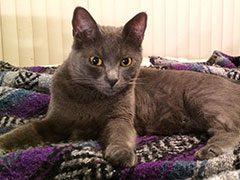December 12, 2017
Cats a step closer to FIP treatment: A clinical trial yield promising applications of antiviral compound

The numbers are looking good for treating a disease in cats that — up to now — has been 100 percent fatal. A field trial is having encouraging results from a treatment involving an antiviral compound developed at Kansas State University and Wichita State University.
Yunjeong Kim and KC Chang, virologists in the College of Veterinary Medicine, and William Groutas, a medicinal chemist at Wichita State University, have been collaborating since 2010 on the development of antiviral drugs for important human and animal viruses.
"Over the course of the last several years, we have generated antiviral compounds that potently inhibit the virus responsible for feline infectious peritonitis, or FIP," Kim said. "This finding led to a collaboration with Dr. Niels C. Pedersen at the University of California, Davis for testing one of the compounds in a clinical trial with cats with naturally-occurring FIP for the last three years."
FIP is a leading cause of death in kittens and young cats and is most common in indoor, multicat environments such as shelters and catteries. The researchers have just published findings in the Journal of Feline Medicine and Surgery: "Efficacy of a 3C-like protease inhibitor in treating various forms of acquired feline infectious peritonitis," which is a follow-up publication of a study published in PLOS Pathogens in 2016.
"The field trial of GC376 was the first antiviral treatment for naturally occurring FIP, and it was designed to address several questions," Kim said. "One of the questions was to find out whether antiviral treatment holds promise in FIP treatment."
Kim said the study looked at patients with different forms of FIP: wet form, dry form and dry-to-wet form.
"They were at different stages with various clinical signs and were recruited into the trial," Kim said. "A total of 20 cats received antiviral treatment and seven of those cats are currently in long-term remission. This trial gave us valuable information regarding which patient groups seem to have a better prognosis for a long-term remission. Typically, acute wet FIP progresses rapidly and kittens are usually euthanized within weeks of diagnosis. But six out of eight kittens with wet FIP that were admitted into the trial are currently in remission with the longest remission time at one and a half years."
Other cats in the trial that were chronically ill also quickly improved on antiviral treatment and had varying duration of clinical remission before many them succumb to neurological disease later.
"This virus infects a cell type that can make its way to the CNS and it seems that this can occur fairly early in many, but not all, cats, although clinical signs may appear later," Kim said. "This tells us that the key to long-term remission would be to start antiviral treatment before viruses have a chance to enter the CNS or establish chronic lesions that are hard to eliminate. Although kittens treated early seem to have a better chance for a cure, most of the affected cats are expected to benefit from antiviral treatment by improved quality of life, regardless of FIP forms."
Kim emphasized how this was a small study consisting of various patient groups, and said a larger trial focusing on each patient group would be needed to confirm the findings.
"From this trial we learned the answer to the important question: antiviral treatment would be an essential component of effective FIP treatment and early diagnosis/treatment is the key to treatment success," Kim said.
